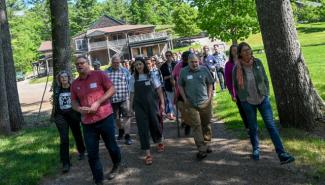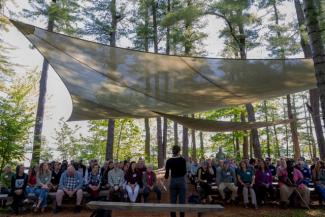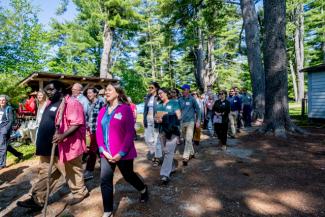
It began with walking. The group all gathered at the lodge, finding coffee and chatting with old colleagues and new, when Ellie Oldach called everyone’s attention and introduced worksongs singer Bennett Konesni, who would be leading us in song throughout the day. Bennett said the crowd would be trying something new together– singing and walking. As he shared, this was “next level” shared singing.
But the group was up for it. Bennett began a “Welcome Back” song and everyone slowly made their way out of the lodge, down a hill, and into the pines by the lake’s edge. There, people settled in a semi-circle of rough pine benches and the day’s program began.
Ellie opened the day with a welcome to all, people who were there last year and people who were not. She described that today was a day to say “What happened?” between this time last year and today, to acknowledge the pain and suffering alongside the accomplishments of the past year, and to look forward to what might be happening a year from now.
Then, a panel of speakers provided four stories in answer to the question, “what’s happened?”. Ethan Miller opened by speaking about the fund, now named Wolankeyutomone kisi apaciyewik, “Let us take good care of what has returned”. He celebrated how the Solidarity Deposit exceeded its fundraising goals, and how ⅔ of the money raised came from organizations and foundations within Wabanaki homelands. “Non-profit organizations that are scrapping together budgets to do their work are showing up in an incredible act of solidarity,” he said. He also pointed towards what’s coming next, describing this fund as a long-term commitment and asking the group: “Can we make land justice a core part of our organizations?"
Non-profit organizations that are scrapping together budgets to do their work are showing up in an incredible act of solidarity. Can we make land justice a core part of our organizations?

Next, Kara Wooldrik spoke about the community commitment to relearning over the past year. “I have the honor of reflecting back to you all the work and questions you are sharing with me,” she said. She ran through a list of changes organizations had reported making, ways they had shifted to prepare for or enact the work of return. “This is always shifting. Today this might feel like a humongous step, but tomorrow it’s easy.” People in the audience clapped and snapped when they heard changes their own organization had made, everything from making Wabanaki access a core part of their mission to committing more time to DEI training to bringing the Solidarity Deposit to their boards. Learning yields further questions and steps to take, and Kara shared those too: “We’re asking, ‘How do we leave scarcity mentality behind and see opportunities to share resources and power and to realize large collective goals in the sector and beyond? How do you live and work presently in the current moment and cultural systems AND at the same time be critical and self-aware so you can create different ways of being that are healthier for all beings?’”.
Next, Mark Berry offered a perspective on the work to return land, highlighting the way land projects can move fast– in a matter of weeks or months– or very slowly. He described a yearslong project to return land to the Passamaquoddy Tribe. This project moved based on the shared commitment of all partners, “a commitment to keep going” even when project details shifted and became harder to work with. In the end, land near an important Passamaquoddy ancestral village site was returned, and strong relationships built to support future work.
Betsy Cook wrapped up the panel by speaking about what organizational change to prepare for and commit to this work looks like. Her organization, Trust for Public Land, has worked towards more land return and Indigenous collaboration for several decades. The work has had successes, and has also gone through downs: “Many things can be true,” Betsy said, “and both of these things are true.” She described the questions facing TPL now, as they work on a land return project with Penobscot Indian Nation: “How does this work persist past changing personnel and leadership? How do we use the work we’re doing today to accelerate and grow a culture of this work?”
Following the panel, participants paused to consider what had happened for their own organizations in the past year. What were they celebrating now? What did they imagine celebrating a year from now? The crowd reflected in the quiet of the pines, then turned to partners and small groups to share their reflections. In sharing out, participants described celebrating the small but important step of making Wabanaki support a clarified line item in their budgets; a hope to be celebrating sovereignty in next year’s legislative cycle; the aspiration to return not just land but the night sky.
Next, Darren Ranco and Suzanne Greenlaw, staff for the Wabanaki Commission on Land and Stewardship, joined the group to share their perspectives and experience of this work to return. Peter Forbes led an interview, asking them about the formation of the Wabanaki Commission, the most important topics the Commission is facing now, their own personal views on where this work of return is coming from, and where it is headed. Darren spoke about the diplomatic teachings of the Wabanaki Commission, describing a commitment to respond when someone shows up. Reflecting on the early days of the collaboration between First Light and the Wabanaki Commission, he remembered, “We realized this First Light group was serious. They don’t just want to learn, they want to transform the same things we do.” Suzanne shared the transition the Commission is in now, moving into a role where land return happens with Wabanaki people and communities directing what places are returned. Both spoke about hope. “Colonization created a narrative where ‘Indigenous’ is the past,” Darren said. “That’s a story against hope for us. We’re still in a place of counternarratives when we talk about Indigenous futures. For us here on this landscape, it has to be a Wabanaki future. For us, collectively.”
Colonization created a narrative where ‘Indigenous’ is the past. That’s a story against hope for us. We’re still in a place of counternarratives when we talk about Indigenous futures. For us here on this landscape, it has to be a Wabanaki future. For us, collectively.
Brett Ciccotelli closed the morning session with a “This I Believe” statement, his description of some of the motivations he carries in this work. “I believe all of us and our organizations are needed,” he shared. “Do you own land, manage land, talk about land, think about land? You are a part of it. Do you drink water, eat lettuce, or find peace beneath a wide dark hemlock? You are a part of it. Returning isn’t just about giving land and access and money—though it is this too. It’s about imagining a returning of the land’s identity to that of, as Darren so often reminds me, a landscape that is a Wabanaki place.”
Everyone returned to the lodge for lunch created from local ingredients by Mike Flynn, tucking into whole smoked alewives, asparagus, and blueberry crisp. Over lunch, participants spread out along long picnic tables, chatting and catching up.
The group reconvened briefly after lunch with another song from Bennett. This time, Bennett wove the names of organizations in the room into a “Hello” song, which had everyone laughing and cheering as they sang back the response. “Hello mud and hello dust, hello Coastal Mountains Land Trust! Hello work, hello vacation, hello Somali Bantu Community Association!”
The afternoon was dedicated to breakout conversations. Kara Wooldrik collected topics and questions from last year’s gathering as well as the intervening year of Community Conversations. Participants broke into twelve breakout groups to lean further into each topic.
When the group came back together, Roger Milliken led a circle conversation. In this format, everyone was invited into a central circle, to speak to their peers then relinquish their seat to make room for someone else’s perspective. Roger prompted the group to think about two questions: What is alive for you now, given all you’ve heard today? And what do you need to sustain the work? Several themes emerged as different community members took their seat to speak. One theme was on gratitude, acknowledging the long histories of people in this room and appreciating the way the community was growing and changing collectively and the opportunity to be in the space today and listen. There was a focus on hope and relationship. Participants described “resting in uncertainty”, not always having a plan, but knowing they carry commitment to this work and figuring out what it looks like together. “Today we have been offering one another guidance,” Abby King reflected. “And I’ve been thinking about Maine Guides. The guide doesn’t know what’s coming, can’t see the future– but it’s about holding space for that uncertainty and being in it together.” David Greenham had a similar reflection: “In this work, you start where you are, and it simply continues the rest of your life.” “We’re doing this work because it is the only path,” Jennifer Melville contributed.
Two speakers closed out the day. Bryan Wentzell shared a “This I Believe”, focused on appreciating how far this community has come and trying to build a felt understanding of what it might feel like to be blocked from 400 generations of land relationship. "Imagine a ten-generation connection [to this land]," he prompted. "Twenty generations? Forty? I can’t claim to know personally Wabanaki connection to this land, but thinking about it this way I can begin to imagine. Imagine that connection, and then imagine being told you can’t go there. No Trespassing. It’s not yours – it belongs to someone else. I can’t know that sense of loss but thinking about it this way we can find empathy and begin to understand the depth of repair needed."
Carol Wishcamper offered the day’s final charge, highlighting how some concepts have shifted for her today. She spoke about time, reminding the crowd that we can’t see the future, but we can see where we’ve come from. Sometimes, she shared, it’s right to pause and step back to make sure we’re all moving together as the future unfolds, to ensure we don’t breach trust with Wabanaki partners as all seek how to return together.
Participants took a few minutes to write their next step, and something they ask of the First Light community, on notecards that were returned to Ellie. And finally Bennett led a closing song.
“Good friends from whom we now must part, where are we bound? Come darkness, come light, where are we bound? Come morning, come night, here is my home.”

Good friends from whom we now must part, where are we bound? Come darkness, come light, where are we bound? Come morning, come night, here is my home.
